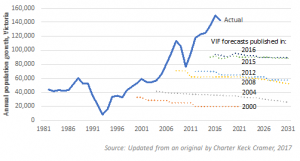
An advisor for some of Melbourne’s biggest transport projects has called out misappropriation of taxpayer dollars and growth forecast “failures” in the state’s $1.9 billion infrastructure pipeline, and criticised NSW for similar malpractice.
A succession of transport projects in Melbourne are plagued by ropey estimates with no guarantee of fair value, a lack of scrutiny and gross underestimates in growth forecasts, MAV’s Smart Urban Futures event heard on Friday.
William McDougall, a leading transport advisor employed as a contractor for key transport projects, told Government News on Friday that a string of transport projects in Sydney and Melbourne have been subject to incorrect cost benefit estimates, with most projects announced before “being properly scoped, costed or appraised.”
Among these are the $5.5 billion Westgate Tunnel, North East Link, East West Link and Suburban Rail Loop in Melbourne, as well as the $16.8 billion WestConnex project in Sydney, according to Mr McDougall.

Undertaking an independent review of the Andrews Government’s $5.5 billion Transurban Westgate Tunnel while employed as a contractor, Mr McDougall says he found the project’s touted benefits were rife with errors and inconsistencies. His concerns were raised in submissions to a senate inquiry in mid-2017.
Mr McDougall and a colleague, John Allard, who was also independently contracted on the project, flagged “major concerns” about the traffic modelling and economic appraisal of the project, which he says “was full of deliberate distortions and questionable assumptions.”
The benefit cost ratios of the Westgate Tunnel and Monash Freeway Upgrade, for example, were “considerably overstated,” he says, with the 1.3 figure quoted deserving a ratio of less than 0.7.
“There was a lot wrong with what was done – a lot wrong with the transport modelling, traffic forecasting and economic appraisal,” he said.
Secrecy and fishy numbers
This project, as well as a number of other projects in Melbourne, are riddled with “secrecy” because of an undue focus on “political promises” and consequently disproportionate cost benefit estimates, Mr McDougall says.
Another key Melbourne transport project, the Monash upgrade, had a cost benefit appraisal of 4.2 – a figure that Mr McDougall said should have been around 2.6.
The Westgate project, announced after the Andrews’ Government was elected, had its business case appraised by the same team who undertook the business case for Westlink, which was later scrapped, according to Mr Andrews.
The appraisal of the project was tainted by “optimism bias,” Mr McDougal said. The fact the project is subsidised by billions of dollars in public funds, including tolls, constitutes a “gross misuse of public funds,” he argues.
“If the Westgate Tunnel is a viable proposition, why are taxpayers contributing through the public purse as well as through paying tolls to Transurban?” he asked.
These project pipelines are often “inconsistent” with advice from Infrastructure Victoria and Australia, which is often ignored or used selectively, Mr McDougall said.
But this is not the only instance of misuse of public funds, according to Mr Andrews. He believes that in a number of transport projects, leaders driven by ideology have “distorted” any realistic measure of the cost benefit ratio of projects.
“There’s a lot of secrecy and deals done behind closed doors and I think wilful misuse of public funds throughout the whole process,” he said.
“The numbers that come up in many of these business cases don’t come under close scrutiny but if you take them as they are announced in the business cases you will get a lot of mixed messages and confusion.”
Forecast failures
Planners have also grossly underestimated the rapid trajectory of growth in Melbourne, Mr McDougall says, leading to poor transport decisions.
“We also have a long history of underplaying future forecasting of growth. These forecasts are always underestimated. For the past 15 years we’ve got forecasting horizons that have gotten shorter and shorter,” he said.
Since 2004, published growth forecasts have been on a downward trajectory, he says.

Mr McDougall has also called out the state government for a lack of strategic direction around the environmental impacts of transport projects.
“There’s a complete disconnect again driven by political ideology. We are not looking at what we need to be doing to minimise climate change let alone address the impacts of it,” he said.
Time to rethink transport planning
Planners need to focus on rigorous, strategic transport planning which is backed by independent assessments to ensure that cost benefit ratios are fair and accurate, Mr McDougall says.
“Somehow we have got to find ways to depoliticise transport infrastructure planning and make it more transparent and justifiable,” he said.
Transport planning into the future needs to focus on mass transit needs in particular, Mr McDougall added.
“We’re running out of capacity really quickly even with Melbourne metro,” he said.
“Mass and active transport have to take up the majority of future growth. We need to set some targets linked to air quality, climate change.”
NSW Roads and Maritime Services told Government News that the WestConnex project was subject to rigorous, independent analysis to ensure fair value. This included a 2013 cost benefit analysis which generated a ratio of 2.55, followed by a 2014 audit which found there was nothing to lead to “significant concerns” in relation to the value for money of the project.
An Infrastructure Australia review of the project also found “a degree of comfort that the project will have net benefits”, a spokesperson said. A subsequent independent analysis under the Infrastructure NSW Major Projects Assurance Framework found a cost benefit ratio of 1.71.
“Major infrastructure projects in NSW are subject to rigorous oversight to ensure their validity and value for the tax payer. During the development stage of WestConnex the usual independent checks and balances were in place,” the spokesperson said.
“This included the development of strategic plans and application of merit basis tests, preparation of detailed business cases, independent assurance, development assessment and consent, and competitive tending to ensure value for money.
“WestConnex has been independently reviewed over the life of the project, with each finding the project benefits exceed the projected costs,” a spokesperson said.
Victoria’s Department of Transport said the government prepared a thorough and diligent business case before committing to the West Gate Tunnel Project and extensive modelling showed it would reduce congestion, cut travel times and return $1.30 for every dollar invested.
Modelling and appraisal of the project was conducted in line with Victorian standards and national Transport Assessment and Planning Guidelines and it was subject to rigorous peer reviews and a detailed assessment and cross examination through the Environment Effects Statement process.
“The West Gate Tunnel Project will deliver benefits for Victorians,” the spokesperson said.
“More than a dozen experts, most with decades of experience, worked on the modelling and economics that underpins this project – their work is world class and it unequivocally supports the project
“The business case was conducted in line with state and federal guidelines and it shows that the West Gate Tunnel will deliver benefit for Victorians.”
Comment below to have your say on this story.
If you have a news story or tip-off, get in touch at editorial@governmentnews.com.au.
Sign up to the Government News newsletter.
Pleased to read that there is acknowledgement of the secrecy and misinformation regarding the infrastructure projects in Victoria and elsewhere that are touted as ‘best solutions’ by Daniel Andrews and his ministers.
Along with many others, I consider the choice of Option A for the North East Link in Victoria to be riddled with many unanswered questions and transparency regarding the methodology in this choice. No-one denies that a North East Link is desperately needed to ease traffic congestion, but the final choice defies logic in many fields. It is only a North South Link at best between the M80 and Eastern Freeway where is will dump an overwhelming amount of vehicles, 40% or more being commercial vehicles, onto an already congested freeway creating worse conditions for users. No amount of widening will ease the problem because the east end is constricted by the three lane Mullum Mullum tunnels whilst the other end is constricted by the congested Hoddle Street and Alexandra Parade network.
The Options of B and C, not so much D that were on offer as alternatives would have completed the M80 in a proper ring road skirting the selected inner route of Option A creating a greatly needed road network in the outer north east. Whilst these options may have been distasteful to some people in the greener suburbs, the majority of residents and road users have been lobbying for upgrades to the now far outdated country roads. Options B and C offer modernisation of the inadequate road network with the inclusion of options for future extensions further out east and north. Plus these options linked directly to the Eastlink Tollway to create a continuous traffic flow, plus many options to exit the new freeway along the new route.
Not only would the current traffic issues of an incomplete M80 Ring Road be addressed but the creation of the upgraded road network in the semi-rural communities would be an absolute boon to locals and emergency services in times of critical incidents such as bush-fires. The existing networks do not, or able to cater for such emergencies.
Before more finances are poured into this incorrect destructive choice, there needs to be a transparent independent enquiry into the selection process which from the outset was slanted to Option A. My comments and observations are from three decades experience of traffic and critical incident management involvement.
Hi William
I can only concur with your comments here. It is so frustrating to see the adhoc way in which transport planning and its outcomes are developed and implemented here in Victoria particularly in relation to fully integrated public transport networks of bus – train – tram connections. I fear the toll road operators and car industry are continuing to be the go to for road transport and as such, influence decision making through the contracts on how – when- and where public transport should be placed so it does not interfere with their toll gathering and car sales. Given the amount of information released publicly regarding the cost benefits of such projects either through the media or via FOI requests. FOI should be changed to read Freedom of Govt Not to Release Information
Where has all this criticism been hiding for the several years of these projects? Even in the depth of Alexandra I have been keeping up with it as best I can, yet this damning criticism is a total surprise to me. I mustneeds get my news online, but every newspaper has coverage there.
Hi Roma. Please do not get me wrong I am not totally against money being spent on road transportation such as these projects. It is the value for money prospect I am looking at over that which can be provided for in a fully integrated transport model for all modes of transport in the Melbourne and Metro Area and which seamlessly links with major transport links to Victoria’s regional cities.
This in the light of the Federal Governments desire now to build up Regional Cities because of the population squeeze in capital cities, and their policy to direct new immigrants to regional areas. You can see that a fully all transport mode inclusive Strategy for the whole of Victoria-not just the Melbourne Area is needed. England is the size of Victoria. Look at the way they do things particularly in and around London. Look at Singapore also. Look at this in the light of another story in this forum of being 20 minutes from anywhere people wish to go to in Capital cities and in this example case Melbourne .
To achieve this you need networked integration of all modes of transport – walking, cycling, scootering public transport ie buses, trains and trams.
It is not rocket science here you only have to look at the past in how Melbourne moved around the cities grid in the 1800,s and 1900,s to the then outer suburbs within a 10 or 15k radius. It really was only in the 1950,s that motor vehicle use became popular and affordable for the masses. They had no option but to walk, ride, catch public transport or in the very early days use a dray ( horse and cart for the unitiated )
Look at this in the light of climate change issues which we have known about since the late 1980,s and the effort and money being spent in developing electric and indeed hydrogen motor vehicle transport.
Look at this in the light of Googles efforts to develop flying transport for cross city and around city transport to alleviate congestion. You will still have to have a mode of transport to get you to and from the take off points to your destination not to mention the re-creation of ground transport networks but in the air to create orderly flight paths.
What it really takes Roma is vision – a wholistic vision with the capacity to think laterally with a fifty to a hundred year view like our forefathers did in a whole lot of aspects relating to infrastructure spend, and most of all to imagine what is possible for the community good including health and wellbeing.
The process then becomes a scheduled program of works on a State, National and Local Level to achieve these goals in this field. Publishing of the program to the general public will then provide an awareness of what is to be achieved and needed in sustainable transport matters.
The same could be said for other major infrastructure requirements needed over the whole of the country.
Many of our strategic planners at State, Federal and Local Government level particularly those with many years experience and skills in these matters( including William) are quiet capable of viewing matters in this way and do so, but unfortunately politics and politicians get in the way and the short term election fix for the need for this party or that to get in or maintain Government and the voracious nature of capitalism ( mates for mates)
Note in no way am I tarring all pollies with the same brush but it truly is about time Governments shifted back a bit more from the concept that privatization is the panacea for everything and truly act for the public.